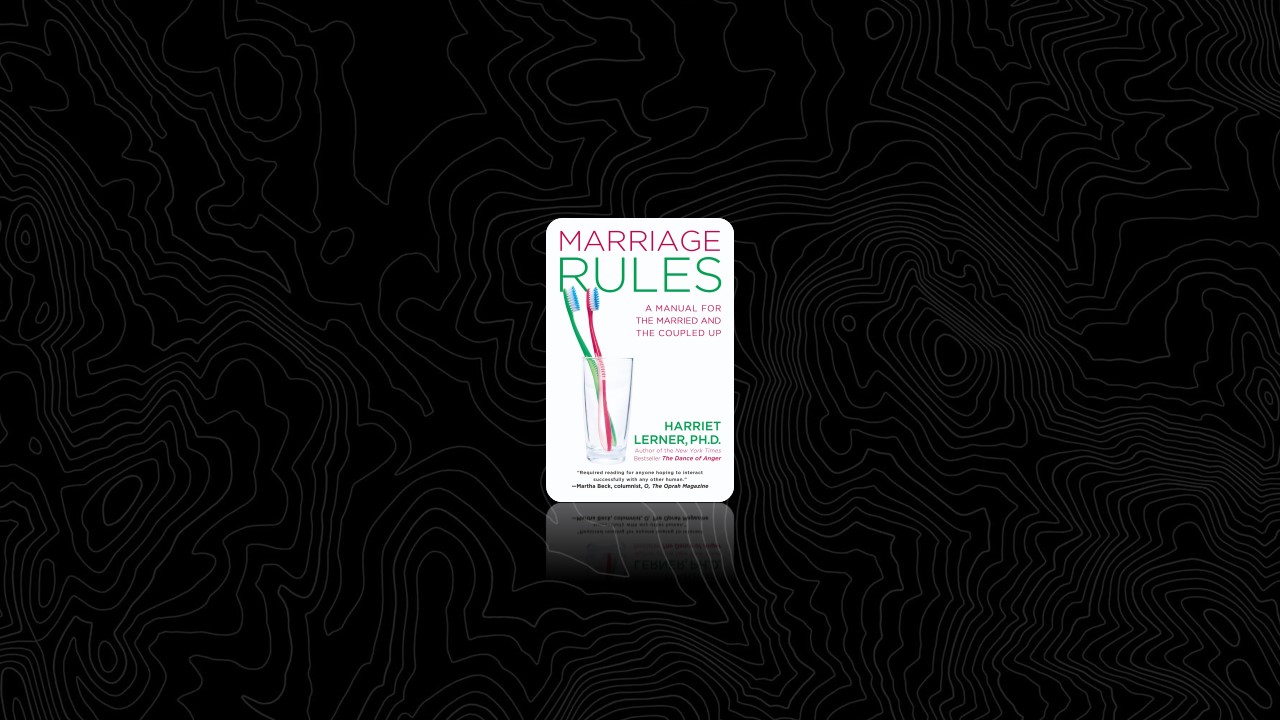RESPECT DIFFERENCES!
Marriage requires a profound respect for differences.
We all view reality through different filters, depending on our class, culture, gender, birth order, genetic makeup, and unique family history. There are as many views of “the truth” as there are people who hold these views. There are also differences in the habitual ways individuals manage anxiety (under stress, she seeks togetherness, while he seeks distance).
Intimacy requires that we do not…
(a) get too nervous about differences.
(b) operate as if we have the truth of the universe.
(c) equate closeness with sameness.
“Respecting differences” doesn’t mean that we accept demeaning or unfair treatment from our partner. It’s just to say that differences don’t necessarily mean that one person is right and one person is wrong. Work on staying emotionally connected to a partner who thinks and feels differently than you do without needing to convince or otherwise fix her.
UNDER STRESS, DON’T PRESS
If you’re a talker, you may find it hard to live with a more private do-it-yourselfer. Surely this is a difference that makes a difference. Maybe you admired his cool, self-reliant style when you first met, but what initially attracts us and what later becomes “the problem” are often one and the same.
While self-disclosing is one way to be intimate, it’s not the only way. Social psychologist Carol Tavris recalls:
Years ago, my husband had to have some worrisome medical tests, and the night before he was to go to the hospital we went to dinner with one of his best friends, who was visiting from England. I watched, fascinated, as male stoicism, combined with English reserve, produced a decidedly un-femalelike encounter. They laughed, they told stories, they argued about movies, they reminisced. Neither mentioned the hospital, their worries, or their affection for each other. They didn’t need to.
Try to appreciate the fact that you and your partner may have opposite ways of managing emotional intensity and getting comfortable. You’ll do better engaging your partner in conversation if you keep in mind that connection in marriage takes different forms and love is communicated in different ways.
BREATHE NOW, SPEAK LATER
Speaking our minds and hearts is at the core of intimacy. We all long to have a marriage that is so relaxed and intimate that we can share anything and everything without thinking about it. Who wants to hide out in a relationship in which we can’t allow our self to be known? The dictate “Be Yourself” is a cultural ideal, and luckily no one else is as qualified for the job.
But speaking out and being “honest” are not always good ideas. Sometimes in the name of authenticity and truth telling we shut down lines of communication, diminish and shame the other person, and make it less likely that two people can hear each other or even stay in the same room. We may talk a particular subject to death or focus on the negative in a way that draws us deeper into it.
Make wise and thoughtful decisions about how and when to say what to your partner. You may want to refrain from speaking when you’re feeling angry or intense, when your partner is in a bad mood, or when you simply don’t have his or her attention.
REMEMBER THE 5:1 RATIO
Try to focus on the positive even if you’re feeling angry and resentful. Aim for a 5:1 ratio of positive to negative interactions (marriage expert John Gottman’s formula for divorce prevention). If you’re feeling very angry with your partner, try the experiment for just one week and see what happens. Even a 2:1 ratio is a good start.
If you can’t find much that’s positive to speak to in your partner, you’ve lost perspective. Every individual has some strength and goodness. Every person is better and more complex than the worst things he or she has done. Every relationship has some rewarding elements, even if both partners have forgotten how to notice and comment on them.
Remember that you can communicate interest, generosity, and love in nonverbal ways, as well as with words and language. A simple gesture—a hand on a back, a nod, a smile—can make a person feel seen and cared for.
GOD IS IN THE DETAILS
Tell your partner the specific things you admire.
Interestingly, adults understand that children of all ages need praise for their specific qualities and behaviors. It’s not good enough to say “You’re the greatest” and “I love you so much.” Kids also need to hear “Great job sharing your toys!” or “I think you were very brave to tell your friend how you felt when she didn’t invite you to her birthday party.”
YOU ALREADY KNOW WHAT TO DO
Books and magazines are filled with tips about how to make a partner feel loved, valued, and special.
You don’t need this advice.
No matter how distant your marriage has become, and no matter how dense you claim to be about relationships, you can close this book right now and come up with three specific actions you can take to warm your partner’s heart and improve things at home.
No expert in the universe knows the way you do what warms your partner’s heart.
It’s getting started and sticking with it that’s the hard part.
There’s an old story about two little kids who are playing together in a sandbox with their pails and shovels. Suddenly a huge fight breaks out and one of the kids runs away screaming, “I hate you! I hate you!” In no time at all they’re back in the sandbox playing together happily again.
Two adults observe the interaction from a nearby bench. “Did you see that?” one asks. “How do children do that? They were enemies five minutes ago.”
“It’s simple,” the other replies. “They choose happiness over righteousness.”
We can save ourselves a great deal of suffering if we strive to be more like those kids. Folks in long-term relationships have a terrible time stepping aside from anger and hurt because our need to be right keeps us from getting back in that sandbox until the other person admits that he started it and is totally wrong. We lock ourselves into negativity at the expense of happiness and well-being.
Obviously there are times when we need to move to the center of a difficult conversation. Some issues need to be revisited, not dropped. We need words to heal betrayals, inequalities, and ruptured connections. But about 85 percent of the time our best bet for relationship happiness is to remember the sandbox—and let those kids be our role model.
FAKE IT FOR TEN DAYS
Perhaps you’re thinking you can’t abide by any of the rules so far, much less stick to them. You’re so angry at your spouse that any sort of “be positive” advice makes you want to gag, especially since it doesn’t feel authentic.
Surely no one aspires to be phony or hang out in a relationship where they can’t be real. Certainly glib affirmations to “think positively” and “focus on the bright side” can conceal real pain and emotional complexity, inviting us to live a lie, which is more serious than telling one.
But here’s the paradox: Couples can get so locked in negativity that sometimes we can only learn what is true, or possible, or “still there” by restraining our so-called true selves. We all need to make a big dent in habitual, unproductive ways of responding to a partner. Experimenting with pretending can be a remarkable achievement in marriage—that is, if you are not pretending out of fear or a wish to deny real problems.
SWEAT THE SMALL STUFF
Big issues come in small packages.
When you agree to do something—no matter how small—do it. If you’ve told her that you’ll clean out the refrigerator by Sunday, do it by Sunday. If Sunday comes along and you’re too busy, take the initiative to say “I’m really sorry I can’t get to it today. I’ll do it tomorrow.”
When you agree to do something—no matter how small—do it.
Never assume that your overall contribution to a relationship or household compensates for failing to do what you say you’ll do. Apologize when you slip up. Do better next time. Don’t use your Attention Deficit Disorder (or any other diagnosis, for that matter) as an excuse for irresponsible behavior.
BE THE ONE TO CHANGE FIRST
If you feel like the “done in” partner, it’s natural to want to react in kind. (“Why should I tell him how much I appreciate him when he doesn’t appreciate me!”)
Why should you be the one to change? Surely it’s not fair for one person to do all the emotional work in your marriage, or even more than 50 percent.
Here’s why:
- You are the only person you can change.
- You’ll be on more solid ground as a person (whether your marriage improves or not) if you keep your behavior in line with your core values about how you want to navigate relationships. (“I want to be a person who balances my automatic critical responses with more positive ones.”) You’ll be on less solid ground if you behave only in reaction to how your partner treats you.
- If you don’t change your part in a stuck pattern, no change will occur. Change comes from the bottom up—that is, from the person who is in the most pain, or who has the least power, or who has lost or compromised too much in the relationship. It’s the dissatisfied partner who usually is motivated to change. If you don’t take some new action on your own behalf, no one else will do it for you.
You are the only person you can change.
Remember this: If you want a recipe for relationship failure, just wait for the other person to change first.


